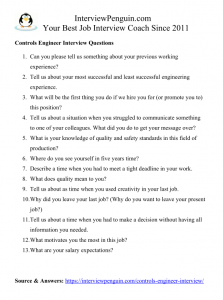Everything turns around endless growth. Companies want to improve their production capacities while reducing costs per unit, and they want to achieve the highest possible efficiency of all processes within a plant. Growth, growth, growth…
Is it a passion, or an obsession? And should we really aim for an endless growth, not looking left or right, not considering environmental and other impact of our production activities? I do not want to be philosophical at this point. At the end of the day, you can give different suggestions as a control engineer, including such that help to reduce the environmental impact of your employer.
Let’s rather have a look at some questions you may face while interviewing for this interesting job.
Table of Contents
Can you please tell us something about your previous working experience?
Try to talk about relevant stuff. Any processes you engineered or improved, any increase in efficiency you managed to deliver. Even if it was just 0.01% improvement, because when we talk about production scale, each minor improvement matters a lot.
In an ideal case you should talk about tangible improvements, and about processes that are at least somehow related to their field of manufacturing or production. Try to include numbers in your answer, but avoid excessive technicalities and professional jargon.
More often than not, Hr people and managers will lead your interview–not technicians. Or at least they will sit in the panel. They would hardly give you a job if they did not understand what you were talking about…
Tell us about your most successful and least successful engineering experience.
Try to look at the success and failure from a viewpoint of your former employer. When you managed to decrease the production time, or made an important change, or implemented a new process which resulted in a better quality of a final product (which directly or indirectly reduced production costs and quality control), it is definitely a success.
On the other hand, when you were imaginative, tried new stuff with good intentions, but ended up disappointed, because the changes you implemented just complicated the manufacturing process or led to worse results, it is an experience we can label unsuccessful.
Even in this case, however, you can turn it upside down and win some extra points. Explain the lessons you learned from your least successful experience, and how it helped you to become even better in your engineering work. At the end of the day, engineering work is always about trial and error. You can hardly design and implement some groundbreaking innovation for your employer, without failing in the process a couple of times.
What will be the first thing you do if we hire you for (or promote you to) this position?
Here you can find yourself facing two scenarios. First one is when you apply for an internal promotion, or, for some other reason, have a good knowledge of the company and the manufacturing processes they have in place.
In such a case, you should suggest particular parts of the production cycle that need to be addressed. You can go as far as pointing out particular processes and areas for improvement. Or at least vaguely suggesting some.
In an opposite scenario, when you know a little about the company, you can suggest the following things:
- Having a one on one with top management and lead managers in production, trying to understand their goals and expectations.
- Doing an internal audit (or studying the results of the latest audit), trying to find areas for improvement. You can combine this with personal inspection of each existing processes that falls within the scope of your responsibilities.
Tell us about a situation when you struggled to communicate something to one of your colleagues. What did you do to get your message over?
You’ll be allowed a luxury of devouring into your engineering work, spending long hours at the drawing board, working with CAD, or with pen and paper, whatever you prefer.
At the of the day, however, you will not run a budget and your suggestions will have to be approved by the managers. They have to understand you first, to have any chance of realistically considering whether or not to proceed with your suggestions.
Ensure the hiring managers that you do not live in your engineering bubble. You can step out of your comfort zone and explain things in a business language, or even in a language of common people.
You can explain a situation from the past when you used demonstration, practical examples, PowerPoint presentation with computerized simulation, or any other tool to get your message over, to help your audience understand. The attitude you show is more important than a particular situation you narrate.
What is your knowledge of quality and safety standards in this field of production?
You can once again find yourself in two positions. First one is when you have actually worked in the field before, and know something about safety standards and regulations. In such a case you can simply refer to your past experience, and illustrate with one or two examples how you managed to uphold the standards, or pointed out to a process that did not adhere with the regulations.
The situation becomes more difficult when you apply for your first engineering job in a given field. In such a case, you can either do some research prior to the interview, and learn about the respective quality and safety standards, or you can honestly admit that you have no knowledge, but understand it belongs to the job. If they hire you, you will study and learn about everything.
As I already mentioned, your attitude matters the most to the interviewers. As long as they see that you are interested and understand the importance of maintaining quality and safety of production, they will typically give you a chance.
Special Tip: You can download the full list of questions in a one page long PDF, and practice your interview answers anytime later, even when offline:

Where do you see yourself in five years time?
In my opinion, this is a really stupid question, especially in engineering interviews. People change jobs a lot in this field. On the top of that, in the current economic climate (quite unstable), and pandemic and everything, it’s hard to predict which companies will survive, and which will end up out of business (or at least will have to let most of their engineers go).
I suggest you to opt for one of the two following answers:
- You do not really know, and try to focus on the present. You love engineering, and you certainly won’t seek another employment, as long as you can still realize your creative ideas in your job, and the employer is satisfied with your work. So at the moment what matters is getting this job with their company, and you will see what will happen next, in a year or in five.
- Pick some area of engineering you’d like to specialize in. Can be some sub-niche of electrical or mechanical engineering, or you can even talk about some specific products or types of products. As long is it at least somehow aligns with the stuff they do in the company, they will be happy with such an answer.
In any case, they should get an impression that you won’t leave them as soon as someone from one of their competitors approaches you with a better salary offer…
Other questions you may face in your Controls Engineer job interview – technical and behavioral
Technical questions–you may face questions specific to the particular field of production or engineering work you try to get. They may even test you with some practical exercise (online or offline), or let you work on a short case study.
Now, the content of the case study (or the tech. questions) really depends on their field of work, and your specialization and experience. It will differ from one company to another, or even from one engineering job to another, within the same corporation.
You can do only one thing to at least somehow prepare for such tests or technical questions in advance–research a lot about their business. What technologies they use, what products they manufacture, any patents they have registered lately, etc. This should help you understand what they may inquire about–at least approximately…
You may also face other, scenario-based questions, extremely popular in the interviews nowadays. Asking these questions, the hiring managers try to understand your attitude to various situations that can happen in the workplace (meeting a deadline, facing ambiguity, having a conflict with a colleague, and so on). To some common scenario-based questions belong:
- Describe a time when you had to meet a tight deadline in your work.
- Tell us about as time when you used creativity in your last job.
- Tell us about an obstacle you overcame.
- Why did you leave your last job? (Why do you want to leave your present job?)
- Tell us about a time when you had to make a decision without having all information you needed.
- Describe a conflict you had with someone in your last job.
- Tell us about a time when you had to meet a tight deadline.
- Describe a situation when you used logic to solve the problem.
- ….
* Special tip: If you experience anxiety, or want to make sure that you stand out with your answers, have a look at our Interview Success Package. Up to 10 premium answers to 31 tricky scenario based questions (+ more) will help you streamline your interview preparation, outclass your competitors, and get this great job. It can be the last part of the puzzle you are missing…
Final thoughts, next steps
It is hard to predict what exactly will happen in your interview for a position for a Controls Engineer, because it depends on many factors.
First and foremost, who leads an interview with you. If it’s an HR person, they won’t ask you any technical questions, for a simple reason: they do not have the capacity to judge the accuracy of your answers. On the other hand, if a senior engineer leads the interview with you, they may use many tough technical questions.
Other determining factor is the situation on the employment market, and the prestige of the company. Engineers are in high demand. HR managers of some smaller and lesser known company will pray that you do well in an interview, and accept their salary offer. You may be the only candidate they managed to bring to the interviews.
On the other hand, when you apply for a job of a Controls Engineer with one of the top players, who are ready to pay $100K+ annually to their new hires, you will typically face a tough competition, and plethora of tricky scenario-based questions, and it will be much harder to stand out.
Consider your situation realistically, do a good research about your prospective employer (including the technical aspects of their work), and try to prepare a short answer to each question from this article. That’s likely the most you can do to improve your chances of succeeding… I wish you good luck!
Matthew
May also interest you:
- Locomotive Engineer interview questions.
- Mechanical Engineer interview questions.
- Chemical Engineer interview questions.

